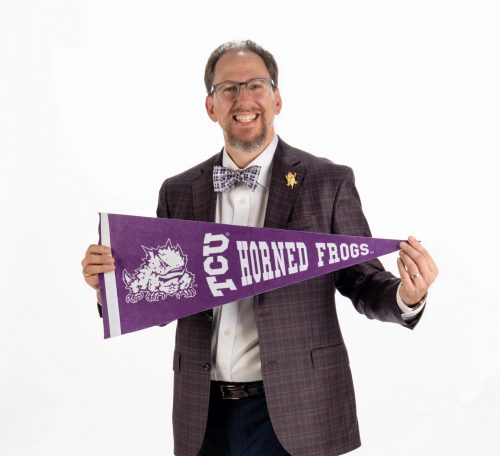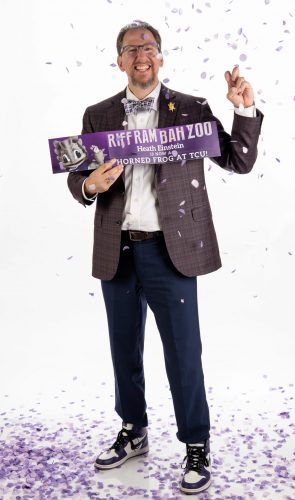From Application to Admission
Amid an increasingly selective admission process, Heath Einstein leads the team that builds the TCU community of the future.

Heath Einstein, dean of admissions, said that 2023 has been a "really fun year ... . It's also been a challenging year because when you’re a highly sought-after school, you don’t say yes to everybody." Photo by Glen E. Ellman
From Application to Admission
Amid an increasingly selective admission process, Heath Einstein leads the team that builds the TCU community of the future.
Heath Einstein, dean of admission since 2017, has a unique background that inspires him to always put students first. With experience as a high school college adviser, Einstein has both empathy for and a deep understanding of the application process from the student perspective. Einstein discussed the challenges and rewards of his role amid TCU’s growing popularity and a changing university admissions environment nationwide.
What was your own experience applying to colleges?
I filled out my applications on a typewriter. Students had to do more work on the front end to know which colleges were the best fit for them. The concept of trying to find a school that’s the right fit hasn’t changed, but the abundant information that now exists about the schools and the ease with which students can attain that information wasn’t as accessible back then as it is now.
Looking back, I don’t think I would do too much differently.
I had a good sense of what college opportunities were available, and I was really lucky in that way. I have two parents and older siblings who went to college, so the concept of going to school, especially going 3,000 miles to school, was not foreign to me. My mother especially was encouraging of us to explore a different region of the country.

Heath Einstein, TCU’s dean of admissions, wouldn’t change much about his college experience, but “the only thing that I feel like I missed out on was having the kind of communal experience that TCU provides.” Photo by Glen E. Ellman
The only thing that I feel like I missed out on was having the kind of communal experience that TCU provides. I was focused on using college as a steppingstone. I think the advice I would have given myself would be to think not just about what I wanted my post-college experience to be like, but what I wanted the college experience to be like itself.
How did your college education at George Washington University shape your career path?
It set me on the path to graduate school at Georgetown University [for public policy], where I learned critical lessons about quantitative analysis and sharp writing skills that I apply daily. Another important part of my college experience was my job working in the admissions office at George Washington University. I fell in love with being on a college campus and found the energy invigorating.
How does your degree in political science from George Washington University influence your problem-solving strategies as dean of admission?
I’m a political person, and I look at everything through a political lens. If you are in a leadership role in any organization, you must understand people and their motivations and persuasions, and by nature, that’s political. I think political science actually helps us understand how people operate in our setting. I remember taking a class as an undergraduate on presidential politics. On the first day of class, the professor asked students to stand up if they thought they were going to be President of the United States one day, and one-third of the class stood up. That’s the world I was operating in during my time in college. If you want to assume positions of leadership, you must understand people.
How does your experience working with college applicants as a high school counselor influence your role as dean of admission?
It’s everything. I don’t think I could effectively manage our team if I didn’t know how the decisions that we make directly impact our end users, who are students. What our messaging looks and feels like is all based on conversations I’ve had with students working in high schools and knowing how that hits the individual and the impact that has on the entire school community. Everything we do is thoughtful and always student-centered. In fact, when we hire new staff, I go through a series of expectations, and the number one expectation is that students come first, above all else. It doesn’t matter what else is going on in your life. When we’re present, and the student is in front of us, they’re the only person who matters.

Heath Einstein said that over-acceptance of first-year students can make it a challenge to find on-campus housing for all enrollees. Photo by Glen E. Ellman
As TCU has grown in popularity, how has the uptick in applications impacted your work?
It’s been a really fun year. Being able to stand alongside all these great things that are happening at the university and to be able to talk about them is incredible. The students and parents are so excited about TCU as well.
It’s also been a challenging year because when you’re a highly sought-after school, you don’t say yes to everybody. We have a lot of challenging conversations in our office with students and parents of students who really want to be here, and we just don’t have space for everybody. I know a lot of people take great pride when a university sees their admission rate plummet. It’s a sign of strength in the eyes of many, but these are real people we’re dealing with, and sometimes that’s not terribly fun. But in the end, we’d rather be here than anywhere else.
How has TCU’s culture changed since you first joined the staff?
I think the changes we see on our campus are reflective of societal changes. We’re much more intentional about creating a campus culture that provides a sense of belonging for the wide range of students who are attracted to TCU and who we want at TCU. I want our students, when they come to visit TCU, to be able to envision themselves here, and that can only happen if we have a campus that is welcoming to all students.
The past few years, TCU’s on-campus housing issues have been a hot topic. How is the admissions office combating over-acceptance?
That’s a big challenge because we never know exactly how students will respond to us. We want to fill the exact number of beds we have, and we don’t want to leave any beds empty. Our first-year class is somewhere between 2,415 and 2,500 students. Being off by 1 percent in yield, or the predicted number of students who will accept their admission, could be the difference of 100 students. It’s not an easy task.
We have an awesome housing residence life department at TCU. We keep them abreast of what the trends are, and what we see throughout the year. I take great comfort knowing our students are incredibly well supported by student affairs. And very often, I hear that students who didn’t necessarily land in their first-choice residence hall or weren’t put in a specific room they were hoping to get almost invariably end up being really satisfied with the experience.
What do you think the future holds for standardized testing?
I would be surprised if we revert back to where standardized testing holds as much weight in the admission process as it once did. I’m speaking not specifically about TCU, but among general college admissions. There are enough colleges that had wanted to go test-optional or test-free before the pandemic started and Covid hastened that process out of necessity; they don’t want to go back.

As dean of admissions, Heath Einstein said that TCU’s location is critical in attracting students because of the opportunities the Metroplex can offer. Photo by Glen E. Ellman
What does Lead On mean to you personally?
Lead On means that we have a responsibility to take this asset that we know is TCU and shine a light for the rest of the world to see. There are so many people here who are doing incredible work, just cutting-edge. Whether it’s our stellar faculty across the disciplines or staff who are continually reinventing themselves and their departments to be a light to others in their fields, it’s what drives us to be the best that we can be.
When I started in this role, I said to our team, “I want us to be the admission office that every college in America looks at and says, ‘That’s the way you do it. That’s Lead On.” I think as an institution, we have a need to say, “This is what we stand for, and we are going to show others how to do this in the best way possible.”
You’ve lived in several different areas, from California to the east coast. How do you think TCU’s location plays a part in student interest?
TCU’s location is integral. I don’t think you can fully appreciate what TCU is without understanding its interconnectedness to the entire Fort Worth community and larger DFW area. What I think is special about Fort Worth is the genuine kindness here, and I appreciate that. It’s a mixture of a city with deep roots but is still welcoming those who are not from here.
What legacy do you want to leave at TCU?
I don’t want anyone on our staff to think there’s a job they do that I wouldn’t be willing to do myself. It’s why I still give information sessions just as any counselor would. It’s why I still have a travel territory like any counselor would. I don’t want anyone to think they’re beneath me because I don’t see myself as above them. I think I bring some important skills to the role, but I also think there’s so many talented people here. I suppose what I want my legacy to be is to maximize the skills of the people around me and to be remembered as the best admissions office we could be when I was here.

Your comments are welcome
Comments
Related reading:
Features
Funding a Future
As the endowment builds, so does TCU’s reach to improve the world.
Alumni, Features
The Write Stuff
Amber Phillips’ persistence and passion for the big story land her a dream job at The Washington Post.
Mem’ries Sweet
Trading Places
The Big Switch gave a student a taste of the chancellor’s day while the chancellor went back to class.